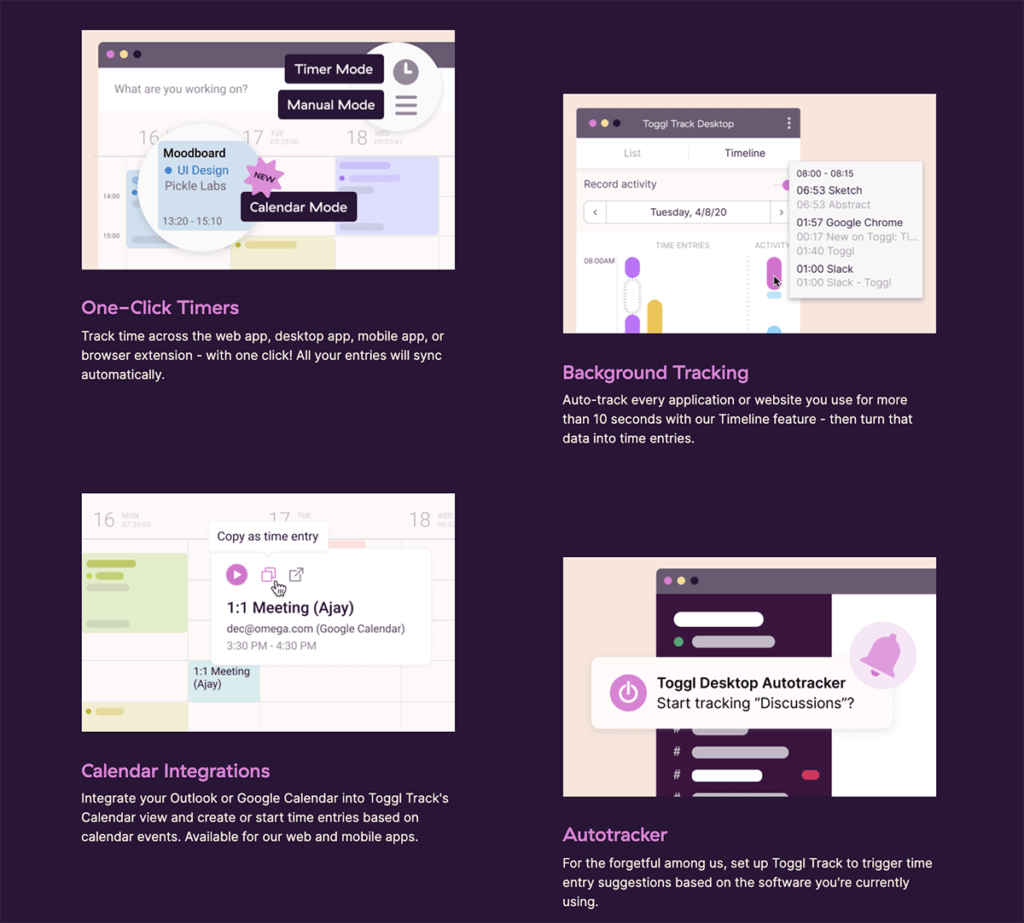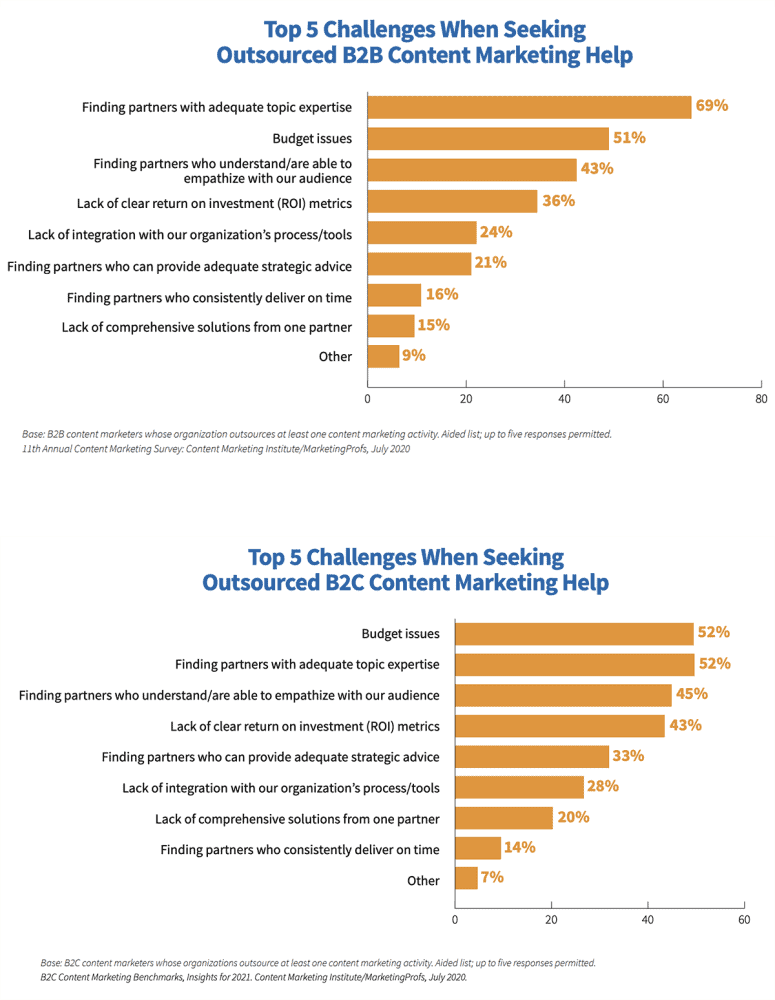Freelance Content Writing Mistakes: 5 Ways Writers Wreck Their Incomes
Want to be among the 28% of freelance writers who earn $45 per hour or more? Then you’ll need to avoid the most common – and disastrous – freelance content writing mistakes.
Here’s the deal: Most freelance writers don’t underearn because they don’t write well. They aren’t short on cash because they don’t work hard. They struggle because they don’t pay enough attention to the business side of their writing.
Here are five ways this shows up, and how to counteract each problem.
1. They don’t know how much they’re actually earning per hour.
If this is you (no judgment!), the first thing to do is to start tracking your time. Build a habit of tracking your time.
This can be as high-tech or as low-tech as you want. You could track your time with a clock and pen and paper. So long as you’re consistent and have a record, anything goes.
There are also free tools like Toggl Track, shown below.

Toggl Track is flexible, in that it lets you track time in several different ways, so it’s more likely to fit with how you work. Time tracking is a super-idiosyncratic thing – and it is, admittedly, kind of a pain. But the rewards are more than worth the pain. So come up with a system that’s as easy to do as possible for you. The easier things are to do, the more likely we are to do them.
I also like Bonsai’s time tracking tool, which is packaged into their freelancing business management platform. Bonsai is $19 per month, but if you crave financial clarity around your writing, it might be worth it.
Once you’ve got a time-tracking system, the next thing to do is to track ALL of the time it takes to do your work and get paid.
Do not fall into the trap of only counting the hours you write.
The time it takes you to earn money from your content writing should also include:
- How long it takes you to find the work
- All the time you spend doing back and forth with the client
- All the time you spend doing revisions
- The time it takes you to create an invoice
- Any follow-up you have to do about unpaid invoices
For example, say you find a client who wants you to write a $500 blog post. Fabulous! Just don’t believe that if it takes you five hours to write that post that you’ve earned $100 per hour. Count ALL the time it takes you to complete that post.
Also include:
- The time it took you to get the work (3 hours)
- The time it took to define the work with the client (1 hour)
- The time it took to send the work to the client, check on their feedback, and make any small changes (1 hour)
- The time it took to send the “is this approved?” email and make the invoice (half an hour)
- The time required to fill out and send a Form 1099-MISC and get the email of the right person in the company to send the invoice to (half an hour)
All in, that’s five hours of writing and six hours of client management. It took 11 hours to earn that $500. You still made $45.45 per hour, but you did not make $100 per hour.
This is one reason why I beg writers to find recurring work. Onboarding new clients is time-consuming, and finding new clients is super-time consuming.
2. They aren’t visible.
Writers tend to be introverts. Not all of us, but many. And many writers would much rather just work hidden behind their laptops than network and market and promote themselves. But writers who hide rarely make bank.
And here’s the thing: You don’t even need a lot of visibility to do well.
A well-optimized LinkedIn profile and a couple of good clips and some outreach are enough to get a few clients.
Once you have a few clients, if you’re brave enough to ask for referrals you can get more clients. And if you get bylines for your work from those clients, then you can leverage those bylines to get more clients.
Visibility is a virtuous cycle.
Believe it or not, there are actually good clients “out there,” right now, looking for good writers. These clients are at their desks right now, reviewing their budgets, wondering where and how they’re going to find someone to write all the stuff they need.
They want to find you. They want to hire you. You just need to make it easy for them to do so.
3. They don’t have a niche or subject speciality.
It is impressive how creatively, vehemently, and articulately some writers resist picking a niche. I hear the same things over and over.
This is the confident version: “I love the variety of my work. I love learning new things. I’d get bored if I wrote about the same thing every day.”
This is the less confident version: “I don’t know enough about anything to be considered an ‘expert.'”
I’m not even going to argue with these statements (though I could). I’m just going to point out that content writers with a niche or subject speciality make seven times more than generalists.
How do they do this? Through three advantages niche writers have over generalists.
Advantage #1: Writers with subject expertise earn three to four times more for the same piece of content. The table shown below is from a content writing platform that pays fairly well. Note that a “generalist” gets $150 for the same post an “expert” would get $600 for. (You can become an expert faster than you’d think, but that’s for another post.)

Advantage #2: Writers with subject expertise have a much easier time attracting and converting clients, so they spend half as much time looking for work.
Finding clients is VERY time-consuming. Many freelance writers spend almost half their time just looking for clients. The easier it is for you to attract clients, or to convince clients to work with you, the more money you will make.
To wit: The chart below shows the biggest challenges B2B content marketers were facing in 2020. Content marketers – the people who hire content writers – said they had a harder time with “finding partners with adequate topic expertise” than they did with their budget. (Remember this was in the pandemic year, when everyone’s marketing budget disappeared.)

Ask yourself this: If you spent half as much time having to look for work, how many more hours could you bill every month? Every year? At even $30 per hour, what would all those saved hours add up to? That’s the value of having a niche.
Advantage #3: Writers with a niche can produce the same amount and quality of content as generalists in half or even a third as much time.
If you know your subject well, you can write about it faster and with more authority than someone who doesn’t. Even if the “someone” you’re competing with is a good writer and researcher. And you can create far better-quality content than a generalist can.
Can generalists create good content? Of course! But it will take them longer than someone who has subject expertise. If you’re being paid per project or per word, how long it takes you to do something matters. The longer it takes you, the less money you earn.
4. They approach content writing as if it was creative writing instead of business writing.
This is a delicate thing to talk about. I do not want to offend creative writers or creative writing. I certainly do not want to disparage personal expression. But I see writers who approach content writing as if it was creative writing suffer repeated, crippling problems.
I am still trying to figure out the best way to talk about this to be both clear and helpful and not offend anyone. For the moment though, I’m going to go with clear and helpful… and just apologize if I offend you.
Content writers who view themselves more as artists than business writers tend to get upset if someone edits their work, for instance. But as this is business writing, there will be editing. There should be editing. A writer should not be upset or surprised about this, and they definitely should not have a mindset that if their piece is edited, their personal artistic expression has been taken from them.
These writers will often also turn away work or a client relationship because it doesn’t fuel their passion.
“Follow your passion and the money will come,” is a very popular idea. And a lot of “start your own business” gurus will tell you that it’s true.
But as Jen Sincero wrote in You Are a Badass at Making Money, “’Follow your passion and the money will come’ looks great on a throw pillow, but it doesn’t do much for the bank account.”
Now, don’t get me wrong: Passion has its merits. You do need some enthusiasm for the subject you’re writing about. Otherwise you’ll get bored, write bad content, and be miserable. But you’re not always going to have passion for your subject. This is work. We show up whether we’re passionate or not. Most days, enthusiasm is enough. A couple of days of passion every month are nice but not necessary.
5. You aren’t tracking your results.
Which tactic works better for you to get clients:
- Sending cold emails
- Networking on LinkedIn
- Writing a free, once-a-month column for an industry website
If you aren’t tracking your hours and your results even in a low-tech, approximate way, you won’t know which actions you’re taking are actually making a difference.
If you don’t know what’s working – or not working – you’re wasting precious time. You aren’t getting as big of a return on your efforts as you could be getting.
6. You aren’t willing to try new things.
Like so many things today, freelance writing is changing. If you haven’t tried one new tactic to find clients in the last few years, you are missing out on an opportunity. If you haven’t changed your rates or the packages you offer, you’re missing out again.
Successful freelance writers don’t chase every shiny new object, but they do learn about new marketing tactics and pick up new ideas for their businesses.
In other words, they learn.
7. You haven’t set yourself up as a business.
Do you have a business checking account? Business cards? A business credit card?
Do you separate your business and personal expenses?
This is easier than it sounds. But it’s one of the most obvious differentiators of professional writers versus hobby writers.
The Good News: Having a Freelance Writing Business Isn’t Any Harder Than Having a Freelance Writing Hobby
Of course, if you don’t need to make any money from your freelance writing, treating it as a hobby is fine.
But if you do need to make more than pocket money from your writing, it is possible. And here’s the best news: The work required to earn $75 per hour or more from freelance writing is not much harder than the work required to earn $15 or less per hour.
You’ll just be doing different things.

